- Home
- Keith R. A. DeCandido
Four Walls Page 5
Four Walls Read online
Page 5
"He's local," Bonasera said. "Lives on Cambridge Avenue and 235th." She looked at Angell and handed her the card.
"Tell you what," Angell said as she snatched the rectangular bit of bond paper from Bonasera's hand, "I need to notify the family. Why don't you do your vampire thing with the people inside while I do that, then we'll meet back here and talk to our suspect, okay?"
Out came Bonasera's fifty-megawatt smile. "Sounds like a plan."
5
JAY BOLTON HATED HIS job. That didn't make him unusual. Most people he knew hated their jobs. Jobs weren't there to like, they were there to be tolerated for the sake of a regular paycheck and inadequate health insurance. That was just the way of the world.
But in his experience, there were two types of employees: the ones who were devoted to their job, who were defined by them, and the ones who did their jobs for the money and stability, but really wanted to be doing something else.
Bolton was one of the latter, and it really pissed him off that it hadn't come to anything yet.
For all of his life, Bolton had wanted to be a writer. He always got A's on his essays in school, and he even had some stuff in the high school literary magazine. Of course, the only people who read that magazine were the teachers, but they thought he had potential. So after he graduated, he started sending his short stories out to get published. He wasn't stupid; he knew writers didn't make a lot of money until they got to the Stephen King or Dan Brown level, so he needed to make a living.
His dad, of course, wanted him to be a cop, like him and Uncle Jake and Grandpa. Dad always went on about how Italian-Americans, Irish-Americans, and Polish-Americans in the city had deep-rooted legacies in the NYPD, going back to the early part of the previous century, and he wanted African-Americans to start building their own heritage among the police force as well.
So it broke Dad's heart when Bolton went into corrections instead.
The problem with being a cop was you couldn't just leave it at the office. Dad, Grandpa, and Uncle Jake certainly couldn't. Bolton had figured being a CO would be a good compromise-still in law enforcement, but in a line of work that gave him plenty of time to think about his stories while on the job and wasn't so stressful that he couldn't focus on putting fingers to keyboard while off the job.
Yeah, Dad was unhappy, but once Bolton was a famous writer with book tours and stuff, it wouldn't matter.
Except for one problem. He hadn't sold anything yet.
Not for lack of trying. He'd written a dozen short stories and four novels in the last six years, and all of them came back with form letters with some variation on "We're sorry, but your manuscript does not fit our needs at this time." It was insane. Bolton read all the time-he lived in Chelsea, and his commute included a subway ride, the ferry, and a bus ride, which gave him plenty of time to read. He kept up with all the latest books, he knew what publishers were buying, and he wrote just like those folks on the bestseller list.
But still, all he got was "your manuscript does not fit our needs at this time."
Made him crazy.
At least yesterday he got to take out some of his frustration during that brawl between the skinheads and the Muslims on the ball field. It wasn't much-you touched a convict, you had to fill out paperwork for a week-but at least he got to yell at some of the skinheads when they tried to get up in Vance Barker's face. He even brandished his nightstick, though he didn't use it.
It wasn't much, but the yelling really let off some steam.
Today, though, the only steam was coming off the ground. It was hot and humid and disgusting. So of course today was the day Ursitti sent him out to watch the convicts in the yard. The ball field was off-limits after yesterday, but they could still wander around the rest of the yard, jog, sit on the benches and play cards or watch television, or use the weight yard.
The weight yard itself was a fenced-in square in the middle of the yard. Right now, forty-five of the Muslims were using it, and the only reason there weren't more was because that was the maximum capacity for the space. Bolton didn't understand why they thought lifting weights was a good idea today, as there was no shade in there. He was half expecting one of them to collapse from heat exhaustion.
But Hakim el-Jabbar wanted to work out, and where he went, as many Muslims as possible followed.
The fence was locked and would stay locked until their time was up, which would be in another twenty minutes or so. After that Bolton was assigned to one of the classes. He couldn't remember which-it was on the board, he'd check. It didn't matter, as long as he was inside. The classes weren't air-conditioned, but at least they had a big fan in the room. It was better than standing out here with no shade.
He shook his head, wiped the sweat off his forehead, and tried to focus. He hadn't been able to think about his latest novel all that much lately for some reason. Instead, he was spending all his time being pissed off about all the rejections, which wasn't helpful.
Since he couldn't seem to focus on the story, he decided to focus on the work. Ursitti had been bitching at him anyhow, saying he was daydreaming on the job.
So he looked around. He had only twenty minutes left, but Bolton had seen fights break out in mere seconds.
Over there, on the far end of the open grass field on the north side of the weight yard, a bunch of Latinos, all members of the Latin Kings, stood around smoking cigarettes and laughing. Another group of the same number stood near enough to keep an eye on them, but far enough away so that they weren't close-these were members of the Bloods. They'd been pretty quiet lately, being wary of each other, not actually getting into it. With this heat, Bolton figured that cease-fire would end damn quick.
Diagonally across the grass field from the gangbangers were Karl Fischer and his redneck squad. They were sharing a laugh over something. Bolton was concerned about that. People didn't laugh much around here, and they certainly didn't in this heat. Every con Bolton saw had darkened armpits and sweat glistening on his forehead. Surly at the best of times, most of them were downright hostile if they were outside right now.
Except Fischer and his boys.
On the south side of the weight yard were the picnic benches, which were under trees and therefore in blessed shade. A bunch of guys were playing cards-gin rummy, from the looks of it, and a couple of guys on the far end were playing some kind of fantasy card game or other. Some were watching one of the two large TVs that were set up. Bolton couldn't see what was on, nor did he care much. He hated television-didn't even own one.
Then he glanced over toward the weight yard, and that got his hackles up. Fischer's boys were slowly moving in the general direction of the weight yard.
After yesterday, no way that was good. Hell, even without the brawl, you didn't want skinheads and Muslims anywhere near each other, even if they were separated by a chain-link fence. Yesterday's disaster proved that pretty thoroughly.
Bolton could see that Sullivan was walking the fence perimeter, keeping an eye on el-Jabbar, who was spotting for another one of his people. Bolton started moving closer to the weight yard. Sullivan could probably use the backup with Fischer hanging that close.
Everything happened very quickly after that.
One of the skinheads-they all looked alike-shoved something into a gap in the fence. The bitter taste of adrenaline welled in the back of Bolton's throat, and he ran quickly toward the weight yard-but it felt like he was moving in slow motion, all of a sudden, even as the hand went between two links in the fence.
Something squirted-it looked like blood. The bitterness in Bolton's throat intensified. Even though he was running at full speed, it felt like he hadn't gotten any closer to the weight yard.
"Shit!"
"He killed him!"
"Son of a bitch!"
Just as Bolton finally got there, the skinheads gathered around each other, like a giant crew-cut sphere. The Muslims started going crazy, banging against the chain-link, the sound of their hands against the metal echoing
into the bright sky.
"You're a dead man!"
"They killed Vance!"
Sullivan's voice sounded over the din. "Everybody get down! Now! On the ground!"
Grabbing his radio, Bolton gave the code for a stabbing. "Red dot in the weight yard, red dot in the weight yard!" Then he whirled around. "Everybody down! Now!"
Slowly but surely, everyone in the yard got down on his stomach. They knew the drill.
About half a dozen COs came running into the yard. Two of them, Andros and Jackson, started shoving the Latin Kings to the grass.
Bolton jogged over to the skinheads. "I said get down! On your stomachs, hands on head, fingers interlaced, now!"
Nobody moved until Fischer nodded. Then they all went down.
As they did so, Bolton noticed a toothbrush on the ground. It was covered in blood and had what looked like a safety razor attached to it.
"I said down!" That was Sullivan yelling to the inside of the weight yard.
One of the Muslims said, "There's blood all up in here, yo!"
"Tough," Sullivan snapped.
Looking up, Bolton saw that the tower officer was out on the catwalk, his M16 at the ready. The Blazer belonging to the mobile unit had stopped just outside the yard fence, and Bolton knew the CO inside had chemical agents ready in case a riot broke out-or in case the Muslims didn't listen to Sullivan.
But, just as the skinheads had behaved at Fischer's signal, when el-Jabbar said, "Obey the CO," in his light, pleasant voice, the Muslims obeyed. El-Jabbar was eloquent and charismatic, something you didn't see very often on either side of the fence in RHCF, and Bolton had actually found himself using el-Jabbar as a template for one of the characters in his novel because of the distinctive way he spoke.
Hakim el-Jabbar motivated people. Right now, Bolton was grateful for that, because he motivated them to lie down in the weight yard with the corpse and the blood.
Bolton blew out a breath of relief. They'd had only one other stabbing since Bolton started working here, and it had been a mess-the convicts had rioted for an hour. This one, though, seemed to have calmed down before anything could happen.
Ursitti came running out to the weight yard, breathing heavily. "Talk to me, Sullivan."
"We got a stabbing here, LT," the CO said. "Shivved through the chain-link."
Captain Russell, the superintendent in charge of security, came jogging out to the yard also. Russell was always scowling, so it was usually hard to tell when he was pissed off and when he was just being himself.
Not right now, though. Right now, he was definitely pissed off.
"Sir," Bolton said, pointing down at the toothbrush, "I think we got our murder weapon right here."
"Don't touch it," Russell said. "Don't touch anything. We'll get CERT in here to take the inmates back to their dorms." He took out his cell phone, pushed two buttons, then said, "This is RHCF. We've got a red dot. We need NYPD in here right away."
Some guys from the Corrections Emergency Response Team came running toward the weight yard. Ursitti looked at them and then turned to Bolton. "Get these guys back to their dorms. Once the yard's secure, we'll put the Muslims away."
"Yessir," Bolton said, but on the inside, he was groaning. It would take at least an hour to get all the inmates cuffed and frisked and brought back to their dorms, maybe more, all of it out in this damn heat. And with a dead body, classes would be canceled, so he'd probably wind up outside for the rest of the day anyhow.
"Shit!" That was one of the Muslims.
"Shut the hell up, Melendez!"
"There's a dead body up in here!"
"We know," Sullivan said, "shut up and-"
"Not Barker, Washburne!"
Bolton felt his eyes go wide, and he ran to the fence and peered in. He saw an array of bodies lying down on the floor of the weight yard, mostly in a row. Two stood out. One was Vance Barker, who was on his back, a gaping, bloody hole in his throat, his big brown eyes wide open. Sweat was still beaded on his bald head, and his mouth hung open, which combined with the slit throat to make it look like he had two mouths and was drinking blood through both of them.
The other body was on its side, with a full head of short-cropped hair, aside from the small round bald spot on the crown. Bolton could see a gash on his forehead, just above his salt-and-pepper beard.
It was Malik Washburne. While Bolton was happy to admit that Barker's death wouldn't be mourned by many beyond his immediate family-if them-he was devastated at Washburne's body lying on the ground. Washburne was one of the good ones-well, as good as a con could be. And he used to be a cop. Bolton's father had known him, back in the day.
Ursitti was wincing. "Damn it."
"Doesn't matter," Russell said. "NYPD'll sort it out. Let's get these people locked down, now."
Jay Bolton really hated his job.
6
STELLA BONASERA HOPED THAT the young women who worked at Belluso's would be understanding of the need for her to take blood and DNA samples from each of them and would let her do so without comment.
Hope, as the saying goes went, springs eternal. They all had questions.
"Why do you have to take my blood?" Jeanie Rodriguez asked. "I mean, I get DNA, that's all over everywhere, but why blood?"
Stella didn't want to admit that they'd found minute traces of blood in the bruises on Maria's knuckles. It could've been Maria's own blood, but if it wasn't, she didn't want to alert any possible suspects to what they'd found. So she just said, "We need to be thorough, that's all. It's best to have as much information as possible."
Dina Rosengaus didn't want her DNA to be in a national database. "It means they can find me anywhere."
"No, really, it doesn't," Stella told her. "It means that if you leave DNA someplace, it's possible for someone to know that you were there. But having your DNA profile doesn't mean we can find you by it."
"Now, maybe. But what about the future? What if they can scan for my-what you call it, DNA profile?"
"If they can do that, they'll already have what they need just from scanning you," Stella said. She had stock answers for all these questions, as she'd gotten them dozens of times.
"But now people can find out where I've been."
"Only if they need to look for it. There are millions of people in the database, with more every day. Nobody could possibly keep track of every single person in there. That's why we only access the information in relation to a crime."
Dina didn't look convinced, but she allowed Stella to take her blood and swab her cheek anyhow.
Annie Wolfowitz backed away from Stella at first. "Don't you need a warrant for that?"
"Only if you don't provide the samples voluntarily. If I can prove to a judge that we need the samples for evidence in a murder investigation-and I have to tell you that it wouldn't take all that much convincing-then I'll have a warrant that will legally compel you to give me blood and DNA samples. But warrants are only needed when the person in question isn't cooperating, and when you don't cooperate, that tends to make cops suspicious."
"Yeah." Annie sighed. "Okay."
After taking a quick bathroom break-which required a key, a level of security Stella thought to be pretty pointless-she finished off with Sal Belluso. The bakery owner spent the entire time muttering in Italian. Stella's own Italian wasn't just rusty, it was oxidized, and Belluso spoke in a dialect Stella didn't know, but she caught enough to know that Belluso wanted the killer very badly and that he wasn't thrilled with all the women cops (the exact term he used was pola, which meant both cop and chick).
She removed the syringe from his arm, grabbed a small square of gauze, and placed it on the puncture. "Hold that," she said.
He obligingly put two fingers down on the gauze. Stella fished out a Band-Aid-the last one she had, luckily; she made a mental note to restock back at the lab-and taped down the gauze.
"By the way," she said as she packed up her gear, "you should know that Detective Angell had t
he best arrest rate of anyone working homicide in the NYPD in 2006. If you want Maria's murder solved, you couldn't be in better hands than that particular pola."
Strictly speaking, that wasn't true. Angell only started doing murder in the spring and had only been working on her own for the final quarter of 2006. Any cases she put down prior to that final quarter were credited to her training officer, Detective Benton. However, she did have the best rate for anyone in that quarter.
But somehow, saying she had the best arrest rate of anyone for one particular three-month period was less impressive. Besides, it was worth it for the slack-jawed, wide-eyed look of shock on Belluso's face. Whether it was from the fact that Stella understood bits of his rumblings in his native tongue or that Angell was actually a talented cop, Stella couldn't be sure, and it ultimately didn't matter.
She went downstairs, her shoes clunking on the solid wood of the staircase that went down the center of the bakery. Through the picture window, she got an excellent view of Riverdale Avenue. Cars and buses ran in both directions, with plenty of the former double-parked in front of various stores. Up the street, she could see a traffic cop writing a ticket for one of those double-parked cars. Stella thought that they probably hit their quota of parking tickets on this street alone.
This block on Riverdale, north of 236th, was entirely commercial. Across the street from Belluso's, Stella saw a bagel shop, a dry cleaner, a diner, a veterinarian, an insurance office, a florist, a gym, a hardware store, a bank, a comic book store, a pizza place, and a stationery store-and that was just on one side of the street and only halfway up the block. She knew that Riverdale was a heavily residential neighborhood; probably most of the businesses were concentrated in this area, leaving the rest for the nice houses of people like the Mitchums, the deaf family whose daughter's murder had been the subject of Stella's previous trip hereabouts last winter.
One of the buses that went by was a shuttle to the Metro-North Railroad. Between that and the city buses that would take people down the hill to the 1 train on Broadway, this block probably saw a lot of commuter traffic. Stella was willing to bet that Belluso's was a hit in the early morning.

 Alien
Alien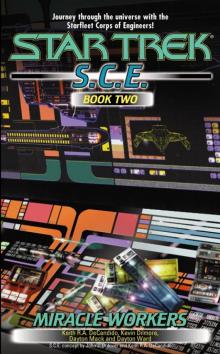 Miracle Workers
Miracle Workers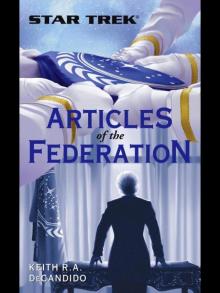 Articles of the Federation
Articles of the Federation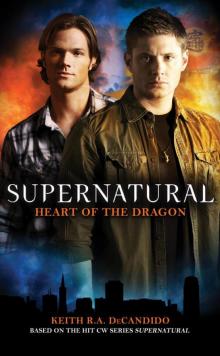 Supernatural Heart of the Dragon
Supernatural Heart of the Dragon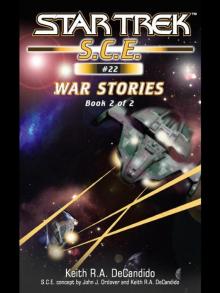 War Stories: Book Two
War Stories: Book Two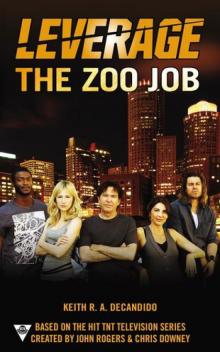 The Zoo Job
The Zoo Job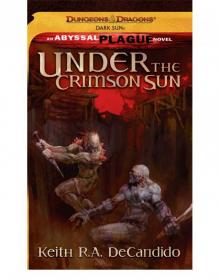 Under the Crimson Sun
Under the Crimson Sun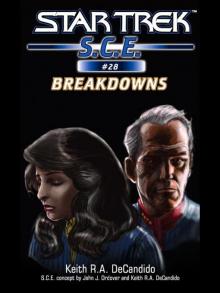 Breakdowns
Breakdowns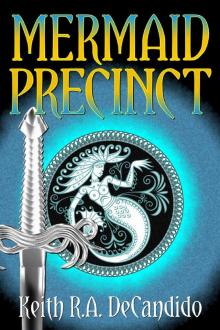 Mermaid Precinct (ARC)
Mermaid Precinct (ARC)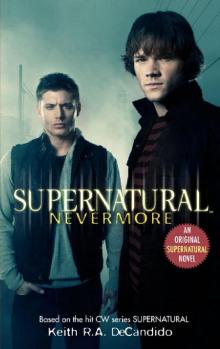 Supernatural 1 - Nevermore
Supernatural 1 - Nevermore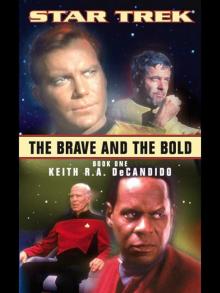 STAR TREK - The Brave and the Bold Book One
STAR TREK - The Brave and the Bold Book One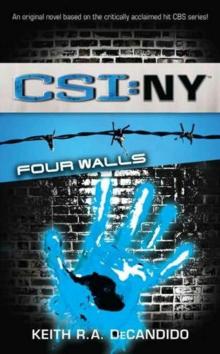 Four Walls
Four Walls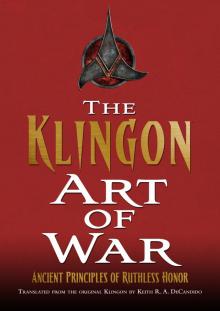 The Klingon Art of War
The Klingon Art of War Blackout
Blackout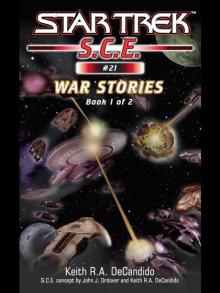 War Stories: Book One
War Stories: Book One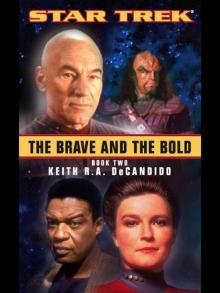 The Brave and the Bold Book Two
The Brave and the Bold Book Two Honor Bound
Honor Bound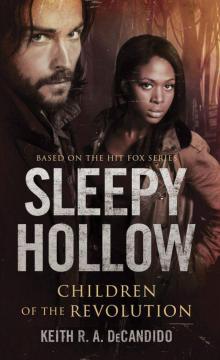 Sleepy Hollow: Children of the Revolution
Sleepy Hollow: Children of the Revolution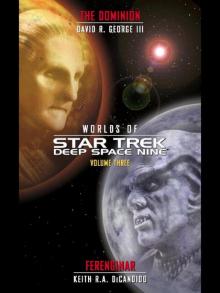 Worlds of Star Trek Deep Space Nine® Volume Three
Worlds of Star Trek Deep Space Nine® Volume Three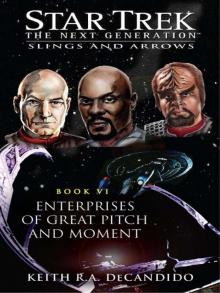 Star Trek: TNG: Enterprises of Great Pitch and Moment
Star Trek: TNG: Enterprises of Great Pitch and Moment Genesis
Genesis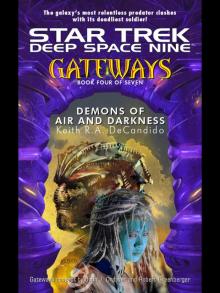 Demons of Air and Darkness
Demons of Air and Darkness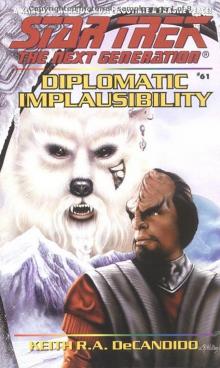 Star Trek - TNG - 61 - Diplomatic Implausibility
Star Trek - TNG - 61 - Diplomatic Implausibility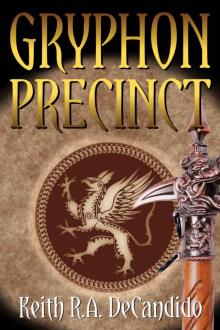 Gryphon Precinct (Dragon Precinct)
Gryphon Precinct (Dragon Precinct)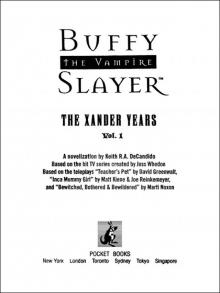 THE XANDER YEARS, Vol. 1
THE XANDER YEARS, Vol. 1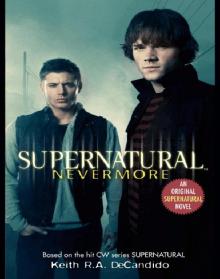 Nevermore
Nevermore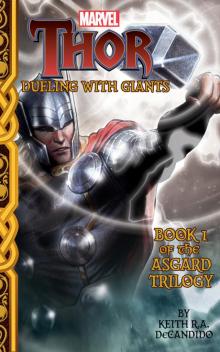 Thor
Thor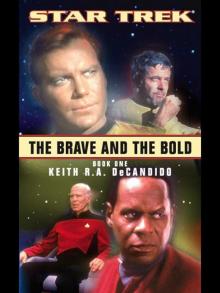 The Brave And The Bold Book One
The Brave And The Bold Book One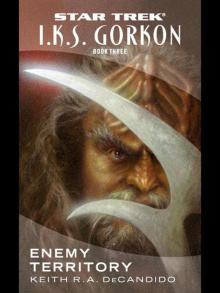 I.K.S. Gorkon Book Three
I.K.S. Gorkon Book Three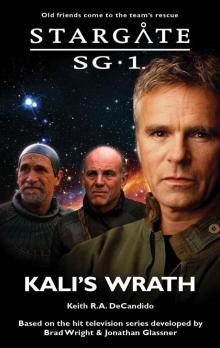 STARGATE SG-1: Kali's Wrath (SG1-28)
STARGATE SG-1: Kali's Wrath (SG1-28)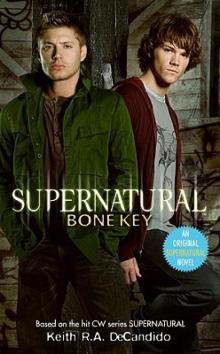 Bone Key
Bone Key Guilt in Innocece
Guilt in Innocece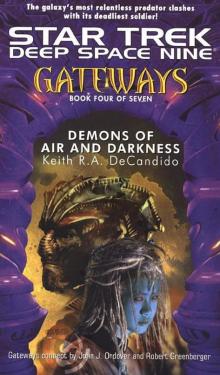 Star Trek - DS9 Relaunch 04 - Gateways - 4 of 7 - Demons Of Air And Darkness
Star Trek - DS9 Relaunch 04 - Gateways - 4 of 7 - Demons Of Air And Darkness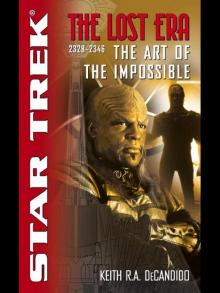 The Art of the Impossible
The Art of the Impossible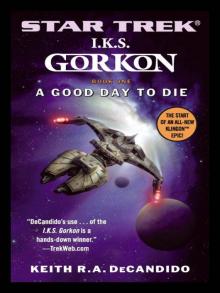 I.K.S. Gorkon Book One: A Good Day to Die
I.K.S. Gorkon Book One: A Good Day to Die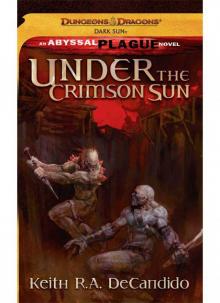 Under the Crimson Sun (the abyssal plague)
Under the Crimson Sun (the abyssal plague)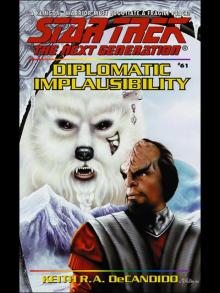 DIPLOMATIC IMPLAUSIBILITY
DIPLOMATIC IMPLAUSIBILITY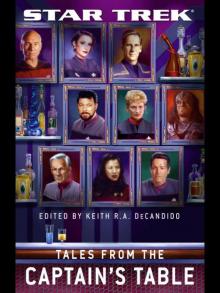 Tales from the Captain's Table
Tales from the Captain's Table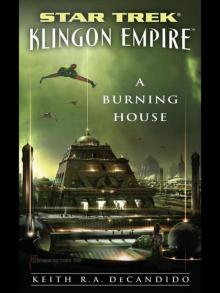 A Burning House
A Burning House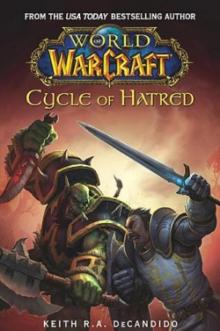 Cycle of Hatred (world of warcraft)
Cycle of Hatred (world of warcraft)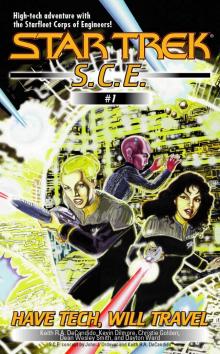 Have Tech, Will Travel
Have Tech, Will Travel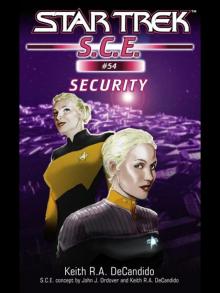 Security
Security